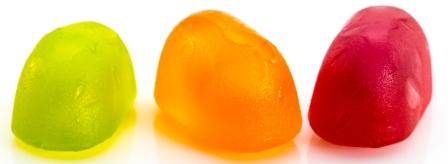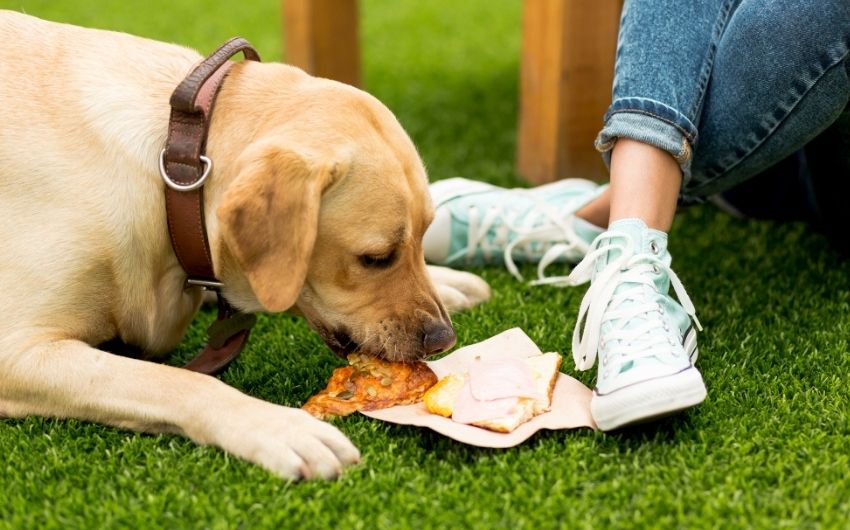When you hurry to make it to your office, the go-to breakfast is either bread-butter or bread-jam. However, although this light breakfast is good for your health, the story could be very different for your pets, specifically, your dogs. So, can your dog eat jam? Well, you won’t cause any harm to your pooch if you feed it a small amount of jam occasionally. However, veterinarians do not recommend the same.
Why isn’t Jam a Good Food Choice for your Dog?
Jam, although pretty tasty, does pack in a lot of sugar and doesn’t provide your pooch any nutritional value. Moreover, excessive sugar fed to dogs can induce in-body inflammation. In the long term, dogs can be diagnosed with diabetes due to unrestricted sugar consumption.
Even though sugar, in a certain amount, is necessary for your pooch, the kind of sugar found in different types of jams is undoubtedly harmful to your pet. Sugar breaks down into glucose post digestion which is then used by the cells of the dog’s body to produce energy.
The lack of sugar could lead to a less energetic dog which could, in the long term, cause multiple health issues as well. However, your dog doesn’t actually need sugar produced in the factories. Since the food they consume comes with a good amount of natural sugar, it helps them churn out energy for their daily needs.
So, if you are wondering whether the sugar present in your jam could be beneficial to your dog’s health, the answer is a big no.
Jam’s Ingredients: Are they harmful to your pooch?
We all know that jams are created from fruits. It means the colorful food option must be healthy for your pooch, right?Well, think again!
Did You Know?
Jams are made to last for a long time and need to adhere to the official sugar requirement labeling to avoid rotting. To sum it up, jam is about 65 percent sugar. With each tablespoon of jam you feed your pooch, they ingest about two tablespoons worth of sugar.
It would surely be a lot of extra sugar for your pooch, especially when fed daily and for the long term.
It doesn’t mean that jams are completely worthless for your pooch. They do contain a certain amount of nutrition that comes from the fruits. However, the nutrition content is way too less as compared to any other healthier option.
Most of the jams are made from fruits such as blueberries, raspberries, strawberries, or any other fruit with a high quantity of vitamin C. But, these fruits, in order to be cooked toa jam-like consistency, must be heated slowly for a long time to exponentially high temperatures. It tends to diminish the fruit’s nutritional content largely.
If you really want your pup to enjoy the benefits of fruits, it is better to mash some bananas or fresh fruits into pulp and serve it as popsicles. You can, in no way, term jam as a healthy option for your four-legged friend.
Is Jam Toxic to Your Dog?

To know the answer to this, let us dig a bit deeper.
To start with, let us decode how jam is made. Well, jam could be comprised of either of the two things:
- A collection of fresh garden-grown fruits that are heated up in combination with pectin and sugar;
- A collection of pesticide-laden fruits heated up in combination with pectin, sugar, preservatives, and artificial colors/flavors
If you are wondering what pectin is, it is a natural and soluble polysaccharide found in fruits. It helps determine how firm or gelled your jam would be. It is also available in a powdered form to be added to the jam if the fruit doesn’t contain enough of it originally. It helps add to the viscosity.
So, how could jam and its ingredients be dangerous for your pup?
1-Fruit:

Your pup’s digestive system is designed to digest only some of the common fruits that humans consume. Given the fact that jam can be made using any type of fruit, it is important to determine the same to understand its toxicity level. Fruits such as banana, watermelon, papaya, etc., don’t harm your pup in any way.
However, you need to avoid jam flavors like cherries, grapes, tomatoes, lemons, plums, limes, and so on. These fruits can be toxic to your pup.
2-Sugar:

A jam is as delicious as the amount of sugar in it. It adds to the texture and flavor of the jam. However, as mentioned earlier, factory-made sugar is not at all needed for the pooch and could be as harmful to your dogs as for you.
3-Acid (Lime or Lemon):
The addition of acid is critical to the creation of jams. While no artificial acid is used, lime or fresh lemon juice is added to the mix. However, these ingredients might not gel well with the dogs. The acidity can lead to vomiting, upset stomach, diarrhea, or weakness. It is possible, especially when the dogs in large quantities eat the jam.
4-Pectin:
As cited by WebMD, a high amount of pectin, when ingested, can cause issues such as diarrhea, loose stools, stomach cramps, or gas. Even pectin dust can lead to asthmatic incidents during the manufacturing process. However, the amount needs to be very high to cause any substantial harm to humans.
The case with dogs is almost similar. A large amount of pectin can cause toxicity in dogs and more so in young pups. Apart from an upset stomach, it can cause breathing difficulties or fluid build-up within the chest.
5-Preservatives and Colors:

One thing that you should avoid feeding your dog, in any case, is artificial food coloring or preservatives. Most branded jams do come with these food coloring and preservatives to allow long-term storage. However, with homemade jams, you can choose not to add the same and create a healthier version of jam.
Diseases Induced Due to Excessive Jam Consumption by Dogs
A treat or two given to your dog once a week in small amounts wouldn’t harm the pooch. However, daily consumption of jam by the dogs for a long duration can induce the given conditions:
- Diabetes:Diabetes is an irreversible condition that affects the entire body’s potential to make use of insulin. Regular consumption of sugar in high amounts damages a dog’s body in the same way it does to a human. Although it might not be evident at the start, diabetes can manifest after a year or two or maybe even 5 years, depending on the dog’s sugar consumption frequency.
- Cavities:Do you remember your mom telling you not to eat a lot of candies? Well, the story is the same for your pet as well. Sugar present in a jam tends to accelerate the damages and cavities present in the gum tissues. It can further lead to issues such as bad breath, bacterial accumulation, and teeth loss for your dog.
- Pancreatitis:When your dog consumes sugar regularly, it prompts your pancreas to make an extra amount of digestive enzymes for metabolizing the glucose. This heavy-set production leads to the inflammation of your dog’s pancreas in the long term. These enzymes can even start digesting the dog’s pancreas causing extreme pain.
- Obesity:Adding jam daily to your pooch’s diet means you are introducing a lot of sugar to its body. It can also add to the weight and lead to issues such as obesity. A few years down the road, your dog can also suffer from joint inflammation, pain, and similar issues. Obesity also drops down the overall quality of your dog’s life. Dogs showing signs of obesity will most likely be lazy and avoid playing.
Can My Dog Eat Raspberry or Strawberry Jam?
While strawberries and raspberries fall on the safer side of the fruit collection for dogs, the key is in moderation. These fruits might pack in a small amount of sweetener termed Xylitol. This sweetener,when fed to the dog in a large amount, can cause serious issues. So, avoid these jam variants as much as possible.
Is Currant Jam safe for dogs?
No, one must not feed currant jam to dogs in any case. Currant such as red, black, or white can pack toxins similar to raisin and lead to issues such as kidney failure & ultimately death when left undetected.
Can I feed Blackberry Jam to my Dogs?
Blackberry is safe when fed to dogs. However, just like any other jam, even the blackberry jam is packed with sugar and is better not given to the dogs.
Does Xylitol harm your pup?
Xylitol is an artificial sweetener that most jam manufacturers add to introduce the required amount of sweetness to the concoction. So, you must go through the ingredients of a store-bought jam as it can actually kill your pup.
This ingredient is a big no to your pet’s health because it is known to stimulate the abrupt release of a hormone known as insulin. It leads to a dangerous and massive decrease in your pooch’s blood sugar level. Xylitol poisoning symptoms can develop about 30-60 minutes post-ingestion. However, you need to keep an eye on the pooch for a minimum of 12 hours to avoid any complications.
Look for symptoms such as:
- Lethargy
- No limb control or unregulated movement
- Collapsing
- Seizures
Steps to Take When Your Pup Accidentally Consumes Jam
A little amount of jam would not show any allergic symptoms or health concerns. However, if the amount is very large, it could lead to adverse issues. Suppose you happen to know that your dog has just ingested jam. In that case, the first thing you need to do is look for any signs of allergies like excessive drooling, hypersalivation, watery eyes, inflammation, or difficulty breathing.
If your pooch doesn’t show any of these symptoms, you do not have to worry about it anymore, but do keep an eye for a minimum of 24 to 48 hours. Apart from this, you also need to check the jam’s ingredient lists. If your product contains grapes or Xylitol, you need to get in touch with your veterinarian to ensure that it isn’t a case of poisoning.
What are the immediate side effects of sugar in dogs?
Apart from the type of fruit used in the jam, sugar present in this breakfast item is a major contributor to your pooch’s bad health. Here are some of the immediate or short-term side effects that affect your pooch due to high sugar consumption via jam.
- Lethargy:Although one might assume that consuming a lot of sugar via jam could make a dog energetic, it sure does! However, there is a catch to it. The energy jump is just for a few minutes or so. However, the pup starts gaining weight and hence the lethargy that comes from sugar consumption.
- Diarrhea and Vomiting:Any new type of food or uncommon addition to a dog’s diet can cause digestive issues such as diarrhea or vomiting in dogs. While natural sugar is regular for dogs, the artificial one fed via jam could be particularly hard for the stomach to handle.
- Dental Troubles:You would be surprised to learn how fast sugar in a jam can rot your pup’s teeth. Sugar tends to react with the bacterial population present in the teeth and destroys the enamel with time. It can further lead to issues such as cavities, tartar, or bad breath.
- Hyperactivity:Dogs, especially young pups, are minimally tolerant to sugar as compared to humans. Even a small spoon of jam could induce behavior change which often turns worse depending on the dosage consumed.
Conclusion
While jam can be a delicious treat for your pooch, it is important to remember the complications it brings in. Try and stick to home-made jam that doesn’t contain harmful ingredients. An occasional spoon of jam could be an amazing surprise for your pooch, but it’s better to avoid it and replace it with real fruit mashed into a paste-like consistency.
Also Read:
Can Dogs Eat Lasagna? Is Lasagna Safe For My Dog

Dr. Aram Baker has been with Santa Clarita Animal Hospital since 1995 and his special interests include behaviour medicine and dermatology. He graduated from the Cleveland Humanities Magnet Program in Reseda, CA and attended California State University at Northridge where he received a Bachelor’s degree in biology. He went on to pursue his Doctorate in Veterinary Medicine at the University of California at Davis. He also spent time in the zoological medicine department at U.C. Davis during his Junior and Senior years. He is dedicated to caring for all pets big or small, young or old with compassion, patience, kindness, and love.
